What does a week at Vinyasa Yoga School look like?
From Monday to Saturday, we have classes on all aspects of yoga, ranging from asanas to anatomy, philosophy to pranayama, and everything in between.
Every Sunday, we arrange an opportunity for you to experience India’s rich culture while bonding with your classmates and teachers. Whether it be rafting on the sacred Ganga, or an insider’s look into Himalayan temples and local ashrams, we take care of the cost of all activities so you can focus on having an unforgettable time!
We aim to give you the perfect balance between deep yogic immersion and ample relaxation time.
View curriculum for:
MONDAY – SATURDAY
Sample 200 Hour Training Schedule6:00 AM
Morning SnackEnjoy a refreshing, warm cup of Chai tea and a fruit snack, and get excited for the day ahead!

6:30 AM
Mantra Chanting & Meditation
Start each morning with Mantra class where you will learn to chant 10 of yoga’s most important mantras, their literal translations and spiritual significance, and how to use them in your daily life and yoga practice.
The word “mantra” can be understood by examining the Sanskrit roots “MAN” = mind, and “TRA” = liberation. Mantras are powerful sounds and words that are chanted repeatedly to awaken powerful energies within and progress into a state of meditation.
Sound vibrations that permeate every cell of your being and allow your mind to dissolve and repose. Mantras are repetitive sounds used to penetrate the depths of the unconscious mind and adjust the vibration of all aspects of your being. Mantras are vibrated through chanting aloud, mental practice, or by listening to them. The experience of how sound vibrations effect your being is Naad yoga.
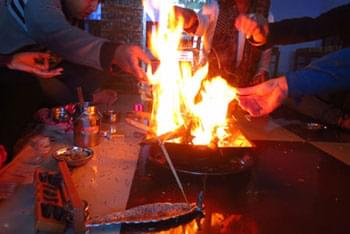
7:15 AM
Shatkarmas
Throughout the week you will also have an introduction to Shatkarmas and their underlying theory.
Shatkarma (“SHAT” = six, “KARMA” = action) is an ancient purification of the body yogic practices. There are 6 types of shatkarmas each which balance our masculine (ida) and feminine (pingla) energies, and rid our body of stagnant waste accumulated over decades of unhealthy living. In our yoga teacher training you will get an introduction to 3 of these ancient practices.
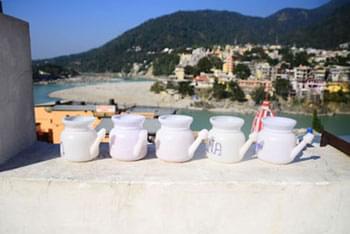
8:00 AM
Hatha Yoga
With your body cleansed and alive, continue your morning with Hatha yoga class. “Hatha” is a combination of “HA” (our right side, associated with aggressiveness, action, the sun) and “THA” (our left side, associated with stillness, peace, the moon). Thus, Hatha yoga practice is the unification of our right and left.
At Vinyasa Yoga School will learn the primary Hatha asanas (postures), the art of alignment, how to construct a class, as well as have several opportunities to teach. This is an important class because Hatha yoga is the foundation of all modern forms of yoga. Mastery of teaching Hatha will give you solid base to teach yoga to yogis of all backgrounds.
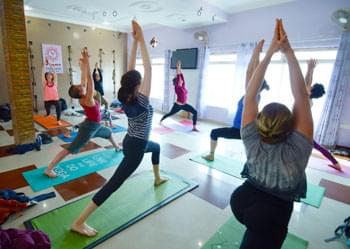
9:00 AM
Pranayama
Pranayama is commonly referred to as breath control (as “PRANA” means breath or vital energy, and “YAMA” means control). In another light, it also refers to the expansion of our vital energy (“PRANA + “AYAMA”, where “AYAMA” means expansion.)
In this class you will learn various breathing techniques to influence the flow of prana throughout the body’s energy channels. You will also learn how to apply pranayama techniques that produce heat (such as Surya Bhedi) and cold (such as Sheetkari) as therapy for various psychosomatic ailments.
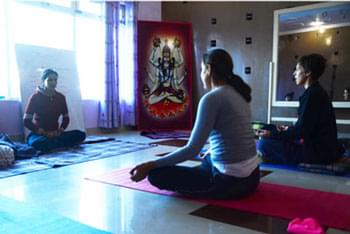
9:30 AM
Meditation
Conclude your morning activities with your morning Meditation class. A common misconception of yoga is that it mainly consists of physically holding and transitioning through asanas. Although practicing asanas have a myriad of proven physical and mental benefits, mastering asanas is an early prerequisite to the ultimate aim of yoga – to reach a meditative state of non-dualistic consciousness.
You will experience and learn various guided relaxations, yoga nidra, and other meditation techniques. You will also have several opportunities to lead your own meditations.
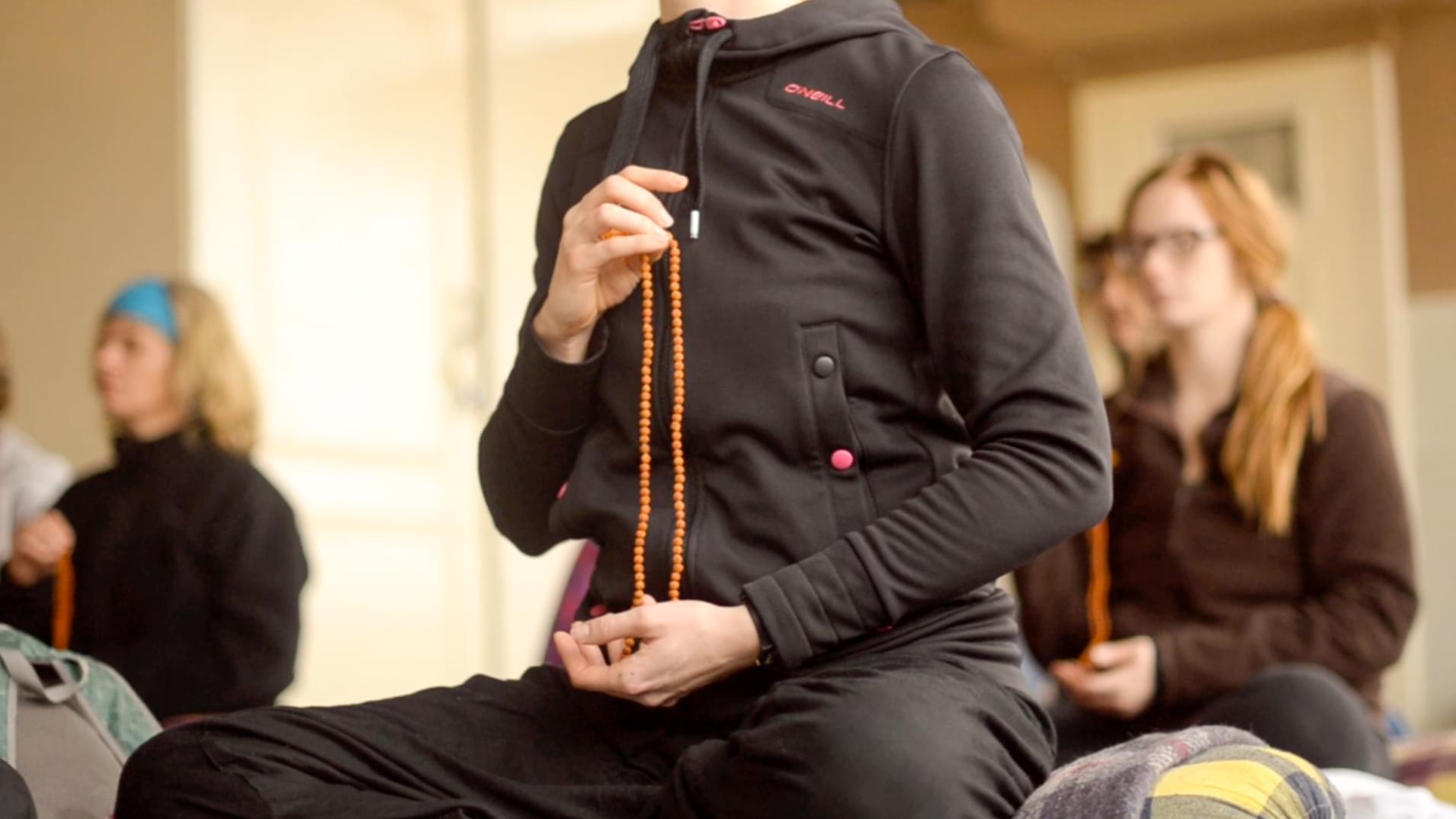
10:30 AM
Meditation
After a enlightening series of classes, enjoy your breakfast with your classmates!

11:30 AM
Philosophy
Explore the origins of yoga by studying the core philosophy and scriptures that have persisted through thousands of years of practice. You will learn about the Bhagavad Geeta and the lessons of Karma yoga, Bhakti yoga, and Gyana yoga. You will learn about the Yog Sutra and how to overcome the various types of thought through the 8 limbs of yoga. You will learn about the physical, astral, and causal bodies.

12:30 PM
Yoga Therapy
Alternative medicine is quickly gaining recognition by Western science as a viable way to treat health problems. In this class you will learn how to apply Yogic Therapy, Marma Therapy, and Acupressure to various psychosomatic issues. Ask our resident therapist about how to treat common ailments of your loved ones.

1:00 PM
Lunch & Break Time
Replenish your body with food and take some time to relax by yourself or to explore Rishikesh with your classmates.

3:00 PM
Anatomy & Physiology
Take a deep dive into your anatomy and physiology to truly understand how yoga affects our body. You will study 5 of the main physiological systems in the human body: Respiratory, Cardiovascular, Digestive, Muscular, Skeletal. You will also learn how to use yoga asanas, pranayama, shat karmas, and meditation to treat problems that arise within each particular physiological system.

4:00 PM
Tea Break
After a full day, enjoy a cup of homemade Chai tea with your classmates before heading into the intensive evening classes.

5:00 PM
Vinyasa Yoga
After your break, head back to the yoga hall or your Vinyasa class. “VINYASA” can be understood by breaking down its roots: “VIN”, to flow, and “YASA”, in a good path. In this light, proper Vinyasa yoga practice requires a “connected breath”. The four elements of mental/visual focus (Dristi), energy locks (Bandha), Ujjai pranayama, and asanas must be connected in flow in order for your practice to transcend beyond a typical workout.
You will practice various Vinyasa flows, as well as learn the underyling theory behind the practice,the art of alignment, and how to construct a class. You will also have several opportunities to teach entire Vinyasa classes, along with constructive feedback from your teacher and classmates.

7:00 PM
Evening Meditation
Wrap up your day by relaxing and withdrawing into your consciousness. You will learn more meditation techniques and their underlying theory. You will get an introduction to Chakra meditations, Prana meditations, creative meditations, and other techniques used in practice for thousands of years. You will also have the opportunity to guide several meditations of your own.

8:00 PM
Dinner
Treat your body to a nourishing meal with your classmates after an intensive day of yoga courses. Eat to your heart’s content of homemade chapati and an assortment of traditional Indian dishes. With no enforced lights-out time, feel free to explore, use our free WiFi to call your loved ones, or rest before another insightful day of yoga classes.

Sunday
Sundays are for rest and relaxation! Enjoy your day off.All Day
Rest + Explore
We believe that experiencing a culture apart from your own is just as transformative as learning yoga. Every Sunday, we arrange an opportunity for you to experience Rishikesh and Indian culture with your classmates and teachers. Whether it be rafting on the Ganga river, or an insider’s look into Himalayan temples and local ashrams, we take care of the cost of all activities so you can focus on having an unforgettable time!

MONDAY – SATURDAY
Sample 200 Hour Training Schedule6:00 AM
Morning SnackEnjoy a refreshing, warm cup of Chai tea and a fruit snack, and get excited for the day ahead!

6:30 AM
Mantra Chanting & Meditation
Start each morning with Mantra class where you will learn to chant 10 of yoga’s most important mantras, their literal translations and spiritual significance, and how to use them in your daily life and yoga practice.
The word “mantra” can be understood by examining the Sanskrit roots “MAN” = mind, and “TRA” = liberation. Mantras are powerful sounds and words that are chanted repeatedly to awaken powerful energies within and progress into a state of meditation.
Sound vibrations that permeate every cell of your being and allow your mind to dissolve and repose. Mantras are repetitive sounds used to penetrate the depths of the unconscious mind and adjust the vibration of all aspects of your being. Mantras are vibrated through chanting aloud, mental practice, or by listening to them. The experience of how sound vibrations effect your being is Naad yoga.

7:15 AM
Shatkarmas
Throughout the week you will also have an introduction to Shatkarmas and their underlying theory.
Shatkarma (“SHAT” = six, “KARMA” = action) is an ancient purification of the body yogic practices. There are 6 types of shatkarmas each which balance our masculine (ida) and feminine (pingla) energies, and rid our body of stagnant waste accumulated over decades of unhealthy living. In our yoga teacher training you will get an introduction to 3 of these ancient practices.

8:00 AM
Hatha Yoga
With your body cleansed and alive, continue your morning with Hatha yoga class. “Hatha” is a combination of “HA” (our right side, associated with aggressiveness, action, the sun) and “THA” (our left side, associated with stillness, peace, the moon). Thus, Hatha yoga practice is the unification of our right and left.
At Vinyasa Yoga School will learn the primary Hatha asanas (postures), the art of alignment, how to construct a class, as well as have several opportunities to teach. This is an important class because Hatha yoga is the foundation of all modern forms of yoga. Mastery of teaching Hatha will give you solid base to teach yoga to yogis of all backgrounds.

9:00 AM
Pranayama
Pranayama is commonly referred to as breath control (as “PRANA” means breath or vital energy, and “YAMA” means control). In another light, it also refers to the expansion of our vital energy (“PRANA + “AYAMA”, where “AYAMA” means expansion.)
In this class you will learn various breathing techniques to influence the flow of prana throughout the body’s energy channels. You will also learn how to apply pranayama techniques that produce heat (such as Surya Bhedi) and cold (such as Sheetkari) as therapy for various psychosomatic ailments.

9:30 AM
Meditation
Conclude your morning activities with your morning Meditation class. A common misconception of yoga is that it mainly consists of physically holding and transitioning through asanas. Although practicing asanas have a myriad of proven physical and mental benefits, mastering asanas is an early prerequisite to the ultimate aim of yoga – to reach a meditative state of non-dualistic consciousness.
You will experience and learn various guided relaxations, yoga nidra, and other meditation techniques. You will also have several opportunities to lead your own meditations.

10:30 AM
Meditation
After a enlightening series of classes, enjoy your breakfast with your classmates!

11:30 AM
Philosophy
Explore the origins of yoga by studying the core philosophy and scriptures that have persisted through thousands of years of practice. You will learn about the Bhagavad Geeta and the lessons of Karma yoga, Bhakti yoga, and Gyana yoga. You will learn about the Yog Sutra and how to overcome the various types of thought through the 8 limbs of yoga. You will learn about the physical, astral, and causal bodies.

12:30 PM
Yoga Therapy
Alternative medicine is quickly gaining recognition by Western science as a viable way to treat health problems. In this class you will learn how to apply Yogic Therapy, Marma Therapy, and Acupressure to various psychosomatic issues. Ask our resident therapist about how to treat common ailments of your loved ones.

1:00 PM
Lunch & Break Time
Replenish your body with food and take some time to relax by yourself or to explore Rishikesh with your classmates.

3:00 PM
Anatomy & Physiology
Take a deep dive into your anatomy and physiology to truly understand how yoga affects our body. You will study 5 of the main physiological systems in the human body: Respiratory, Cardiovascular, Digestive, Muscular, Skeletal. You will also learn how to use yoga asanas, pranayama, shat karmas, and meditation to treat problems that arise within each particular physiological system.

4:00 PM
Tea Break
After a full day, enjoy a cup of homemade Chai tea with your classmates before heading into the intensive evening classes.

5:00 PM
Vinyasa Yoga
After your break, head back to the yoga hall or your Vinyasa class. “VINYASA” can be understood by breaking down its roots: “VIN”, to flow, and “YASA”, in a good path. In this light, proper Vinyasa yoga practice requires a “connected breath”. The four elements of mental/visual focus (Dristi), energy locks (Bandha), Ujjai pranayama, and asanas must be connected in flow in order for your practice to transcend beyond a typical workout.
You will practice various Vinyasa flows, as well as learn the underyling theory behind the practice,the art of alignment, and how to construct a class. You will also have several opportunities to teach entire Vinyasa classes, along with constructive feedback from your teacher and classmates.

7:00 PM
Evening Meditation
Wrap up your day by relaxing and withdrawing into your consciousness. You will learn more meditation techniques and their underlying theory. You will get an introduction to Chakra meditations, Prana meditations, creative meditations, and other techniques used in practice for thousands of years. You will also have the opportunity to guide several meditations of your own.

8:00 PM
Dinner
Treat your body to a nourishing meal with your classmates after an intensive day of yoga courses. Eat to your heart’s content of homemade chapati and an assortment of traditional Indian dishes. With no enforced lights-out time, feel free to explore, use our free WiFi to call your loved ones, or rest before another insightful day of yoga classes.

Sunday
Sundays are for rest and relaxation! Enjoy your day off.All Day
Rest + Explore
We believe that experiencing a culture apart from your own is just as transformative as learning yoga. Every Sunday, we arrange an opportunity for you to experience Rishikesh and Indian culture with your classmates and teachers. Whether it be rafting on the Ganga river, or an insider’s look into Himalayan temples and local ashrams, we take care of the cost of all activities so you can focus on having an unforgettable time!

MONDAY – SATURDAY
Sample 300 Hour Training Schedule5:00 AM
Morning SnackEnjoy a refreshing, warm cup of Chai tea and a fruit snack, and get excited for the day ahead!

5:30 AM
Vinyasa Yoga
“VINYASA” can be understood by breaking down its roots: “VIN”, to flow, and “YASA”, in a good path. In this light, proper Vinyasa yoga practice requires a “connected breath”. The four elements of mental/visual focus (Dristi), energy locks (Bandha), Ujjai pranayama, and asanas must be connected in flow in order for your practice to transcend beyond a typical workout.
You will practice advanced Vinyasa flows, and build upon the underyling theory behind the practice, the art of alignment, and how to construct a class. You will also have several opportunities to teach entire Vinyasa classes, along with constructive feedback from your teacher and classmates.

9:15 AM
Pranayama
Pranayama is commonly referred to as breath control (as “PRANA” means breath or vital energy, and “YAMA” means control). In another light, it also refers to the expansion of our vital energy (“PRANA + “AYAMA”, where “AYAMA” means expansion.)
In this class you will learn advanced breathing techniques to influence the flow of prana throughout the body’s energy channels. You will also learn how to apply pranayama techniques that produce heat (such as Surya Bhedi) and cold (such as Sheetkari) as therapy for various psychosomatic ailments.

10:15 AM
Breakfast
After a enlightening series of classes, enjoy your breakfast with your classmates!

11:15 AM
Philosophy
Explore the origins of yoga by studying the core philosophy and scriptures that have persisted through thousands of years of practice. You will learn about the Bhagavad Geeta and the lessons of Karma yoga, Bhakti yoga, and Gyana yoga. You will learn about the Yog Sutra and how to overcome the various types of thought through the 8 limbs of yoga. You will learn about the physical, astral, and causal bodies.

12:30 PM
Anatomy, Health & Safety, Business of Yoga
Take a deep dive into our anatomy and physiology to truly understand how yoga affects our body. You will study 5 of the main physiological systems in the human body: Respiratory, Cardiovascular, Digestive, Muscular, Skeletal. You will also learn how to use yoga asanas, pranayama, shat karmas, and meditation to treat problems that arise within each particular physiological system.

1:30 PM
Lunch Break
After replenishing your body with food, take some time to relax by yourself or to explore Rishikesh with your classmates.

2:30 PM
Yoga Therapy
Alternative medicine is quickly gaining recognition by Western science as a viable way to treat health problems. In this class you will learn how to apply Yogic Therapy, Marma Therapy, and Acupressure to various psychosomatic issues. Ask our resident therapist about how to treat common ailments of your loved ones.

3:45 PM
Adjustments + Use of Props
You’ll have a full hour and a half each day to practice and master the art of adjustments. Each body and soul is different, and you’ll learn how to prescribe variations to meet the needs of the variety of students that you’ll encounter while you teach. We will also practice employing a variety of props: blocks, blankets, ropes, cushions, and etc.

5:30 PM
Yin Yoga
Yoga is about a balance of energies. A majority of modern yoga focuses on a more intense physical practice, and it is equally important to invoke relaxation and calm. In our Yin Yoga class, you’ll practice and learn restorative yoga techniques as a form of mental and physical therapy. Yin Yoga focuses on more deeper stretches that target our underlying connective tissue, and helps to relieve stress.

7:00 PM
Tea Break
After a full day, enjoy a cup of homemade Chai tea with your classmates before heading into the intensive evening classes.

7:15 PM
Evening Meditation
Wrap up your day by relaxing and withdrawing into your consciousness. You will learn more meditation techniques and their underlying theory. We’ll be practicing more advanced and deeper forms of Chakra meditations, Prana meditations, creative meditations, and other techniques used in practice for thousands of years. You will also have the opportunity to guide several meditations of your own.

8:15 PM
Dinner
Treat your body to a nourishing meal with your classmates after an intensive day of yoga courses. Eat to your heart’s content of homemade chapati and an assortment of traditional Indian dishes. With no enforced lights-out time, feel free to explore, use our free WiFi to call your loved ones, or rest before another insightful day of yoga classes.

Sunday
Sundays are for rest and relaxation! Enjoy your day off.All Day
Rest + Explore
We believe that experiencing a culture apart from your own is just as transformative as learning yoga. Every Sunday, we arrange an opportunity for you to experience Rishikesh and Indian culture with your classmates and teachers. Whether it be rafting on the Ganga river, or an insider’s look into Himalayan temples and local ashrams, we take care of the cost of all activities so you can focus on having an unforgettable time!

MONDAY – SATURDAY
Our 500 hour training is a 56 day training that combines our 200 and 300 hour trainings into one program. Please select the 200 or 300 hour training options to get a sense of the daily schedule for each training.Sunday
Sundays are for rest and relaxation! Enjoy your day off.All Day
Rest + Explore
We believe that experiencing a culture apart from your own is just as transformative as learning yoga. Every Sunday, we arrange an opportunity for you to experience Rishikesh and Indian culture with your classmates and teachers. Whether it be rafting on the Ganga river, or an insider’s look into Himalayan temples and local ashrams, we take care of the cost of all activities so you can focus on having an unforgettable time!

"I came to India to learn yoga, and I ended up learning more about life"
Coming to India, studying in India, being amongst all these people from all over the world has literally been a dream. I’m so fortunate to have this experience. The teachers were amazing, the school is incredible! You deserve this. If you are even thinking about becoming a yoga teacher, come here!
– Fatima M.
View curriculum for
Pranayama and its postures
-
- Easy pose
- Padmasana
- Half-lotus
- Swastikasana
- siddha yoni asana
- Introduction of Pranayama
- General guidelines
- Benefits of pranayama
- Clavicular
- Thorocic and Diaphragmatic Breathing (Yogic Breathing)
- Ujjayi
- Bhastrika
- Kapalbhati
- Nadi – Sodhana
- Bhramari
- Surya – Bhedi & Chandra – Bhedi Sheetali & Sheetkari
Mantra Chanting
-
- Om Asato Maa Sadgamaya (Mantra from Upanishad)
- Tvameva mata ca pita Tvameva (Sloka on gods)
- Om Tryambakam Yajamahe ( Mantra on lord shiva)
- Om sahana vavatu ( Mantra from Upanishad)
- Guru Brahma Guru Vishnu Gurudevo maheshwara ( Guru stotram)
- Yogena Cittasya ( Sloka on sage Patanjali)
- Hare rama, Hare Krishna ( Maha mantra)
Mudras
-
- Jnana mudra
- Chin mudra
- Yoni mudra
- Shambhavi mudra
- Nasikagra
Bandhas
-
- Preparation
- Uddiyana
- Jalandhar
- Mula & Maha Bandha
- Teaching
- Doubts
Shatkarma
-
- Rubber-neti
- Jalaneti
- Kapalbhati- cleansing the lungs
Yoga Nidra
-
- Basic Relaxation
- Tension Relaxation
- Full Body Relaxation
Yoga Philosophy
-
- Introduction to yoga ,
- its philosophy and evolution
- Introduction to yoga sutras of patanjali
- Definition of yoga
- 4 aspects of mind and its functions
- Daily Schedule of a yoga student
- Principles of 5 Basic element & 10 Senses
- Yama , Niyama (4 days)
- Asana , Pranayama & Pratyahara , Dharana , Dhyan , Samadhi (2 Days)
- Pancha – Vayus
- Panchakoshas
- Sattva , Rajas & Tamas (Triguna)
- Introduction to chakras and its functions
- Three Doshas
- 4 padas of yoga sutras
- Lives of yogis (Inspiring stories)
- Diet & Nutrition for a yogi
- Question & Answers
Anatomy and Physiology
-
- Digestive System
- Respiratory System
- Circulatory System
- Nervous System
- Endocrine System
- Organs Bodily systems
- Nadis
- Chakras
- Muscular System
- Skeletal Sytem
- Muscle Functions according to Joint Movements
- Breathing
- Inversions
- Svasana
Teaching Methodology
-
- Positive & conscious communication Friendship and trust
- Time management
- Qualities of a teacher
- Principles of demonstrating, observation,
- assisting,
- correcting
- Use of voice in class
- Mental & emotional preparation for teaching
- Class preparation
- Step by step class structure planning.
Evaluation is based on:
-
- Written Test
- Asana Practical Test
- Attendance
- Performance
- Behaviour
Pranayama and its postures
-
- Easy pose
- Padmasana
- Half-lotus
- Swastikasana
- siddha yoni asana
- Introduction of Pranayama
- General guidelines
- Benefits of pranayama
- Clavicular
- Thorocic and Diaphragmatic Breathing (Yogic Breathing)
- Ujjayi
- Bhastrika
- Kapalbhati
- Nadi – Sodhana
- Bhramari
- Surya – Bhedi & Chandra – Bhedi Sheetali & Sheetkari
Mantra Chanting
-
- Om Asato Maa Sadgamaya (Mantra from Upanishad)
- Tvameva mata ca pita Tvameva (Sloka on gods)
- Om Tryambakam Yajamahe ( Mantra on lord shiva)
- Om sahana vavatu ( Mantra from Upanishad)
- Guru Brahma Guru Vishnu Gurudevo maheshwara ( Guru stotram)
- Yogena Cittasya ( Sloka on sage Patanjali)
- Hare rama, Hare Krishna ( Maha mantra)
Mudras
-
- Jnana mudra
- Chin mudra
- Yoni mudra
- Shambhavi mudra
- Nasikagra
Bandhas
-
- Preparation
- Uddiyana
- Jalandhar
- Mula & Maha Bandha
- Teaching
- Doubts
Shatkarma
-
- Rubber-neti
- Jalaneti
- Kapalbhati- cleansing the lungs
Yoga Nidra
-
- Basic Relaxation
- Tension Relaxation
- Full Body Relaxation
Yoga Philosophy
-
- Introduction to yoga ,
- its philosophy and evolution
- Introduction to yoga sutras of patanjali
- Definition of yoga
- 4 aspects of mind and its functions
- Daily Schedule of a yoga student
- Principles of 5 Basic element & 10 Senses
- Yama , Niyama (4 days)
- Asana , Pranayama & Pratyahara , Dharana , Dhyan , Samadhi (2 Days)
- Pancha – Vayus
- Panchakoshas
- Sattva , Rajas & Tamas (Triguna)
- Introduction to chakras and its functions
- Three Doshas
- 4 padas of yoga sutras
- Lives of yogis (Inspiring stories)
- Diet & Nutrition for a yogi
- Question & Answers
Anatomy and Physiology
-
- Digestive System
- Respiratory System
- Circulatory System
- Nervous System
- Endocrine System
- Organs Bodily systems
- Nadis
- Chakras
- Muscular System
- Skeletal Sytem
- Muscle Functions according to Joint Movements
- Breathing
- Inversions
- Svasana
Teaching Methodology
-
- Positive & conscious communication Friendship and trust
- Time management
- Qualities of a teacher
- Principles of demonstrating, observation,
- assisting,
- correcting
- Use of voice in class
- Mental & emotional preparation for teaching
- Class preparation
- Step by step class structure planning.
Evaluation is based on:
-
- Written Test
- Asana Practical Test
- Attendance
- Performance
- Behaviour
300 Hour Yoga Teacher Training Syllabus
Vinyasa Flow
-
- Standing Yogasanas
- Seated Vinyasa Sequences
- Seated posterior stretch sequences
- Single-leg yogasanas
- The supine sequence
- The bow pose sequence
- The triangle pose sequence
- The inverted posture sequence
- Meditative pose sequence
Yin Yoga
-
- Major groups of Yin yoga poses with all variations and modifications
- The Art of Teaching Yin Yoga
- Different forms of Yin Yoga classes: restorative yin, yin as meditation, anatomical approach in yin yoga, creative yin, etc.
- Anatomy in the context of Yin Yoga
Postures
-
- Surya Namaskar A
- Surya Namaskar B
- Full Primary Series
- Padangusthasana
- Padahasthasana
- Utthita Trikonasana
- Parivrtta Trikonasana
- Utthita Parsvakonasana
- Parivrtta Parsvakonasana
- Prasarita Padottanasana A B C & D Parsvottanasana
- Eka Pada Padangusthasana A B C & D
- Ardha Baddha Padmottanasana
- Utkatasana
- Virabhadrasana A & B
- Dandasana
- Paschimottanasana A B C & D
- Purvattanasana
- Ardha Baddha Padma Uttanasana
- Triang Mukaikapada Pashimottanasana
- Janu Sirsasana A B & C
- Marichyasana A B C & D
- Navasana
- Bhujapidasana
- Kurmasana
- Supta Kurmasana
- Garbha Pindasana
- Kukkutasana
- Baddha Konasana A & B
- Konasana
- Upavishta Konasana
- Supta Konasana
- Supta Padangusthasana A & B
- Ubhaya Padanghusthasana
- Urdhva Mukha Pashimottanasana
- Setu Bandhasana
- Urdhva Dhanurasana
- Salamba Sarvangasana
- Halasana
- Karnapidasana
- Urdhva Pindasana
- Matsyasana
- Urdhva Padmasana
- Sirsasana
- Urdhva Dandasana
- Baddha Padmasana
- Yogimudra
- Uplutih
- Savasana
Pranayama (Breathing Control)
-
- Introduction of Paranayama
- The pranic body
- Annamaya kosha
- Manomaya kosha
- Pranamaya Kosha
- Vijnanamaya Kosha
- Anandamaya Kosha
- Natural Breathing
- Abdominal Breathing
- Thoracic Breathing
- Clavicular Breathing
- Yogic breathing
- Nadi shodhana
- Pranayama techniques
- Sheetali Pranayama & Sheetkari pranayama
- Bhramari pranayama
- Ujjayi pranayama
- Bhastika Pranayama
- Kapalbhati Pranayama
- Moorchha Pranayama
- Surya Bheda Pranayama
- Chandra bhedana pranayama
- Swana pranayama
Mantra Chanting
-
- Om Asato Maa Sadgamaya
- Om Tryambakam Yajamahe
- Guru Brahma Guru Vishnu Gurudevo maheshwara
- Om sahana vavatu
- Hare rama Hare Krishna
- Vakratunda Mahakaya Mantra Yogena Cittasya
- Om Bhur Bhuva Swaha
- Tvameva mata ca pita Tvameva
Mudra (Yoga Gestures)
-
- Introduction of Mudras
- Jnana & Chin mudra
- Yoni mudra
- Bhairava mudra
- Hridaya mudra
- Khechari Mudra
- Nasikagra mudra
- Shambhavi mudra
Bandhas (Energy locks)
-
- Introduction to bandha
- Jalandhara bandha
- Moola bandha
- Uddiyana bandha
- Maha bandha
Dhyana (Meditation)
-
- Introduction to Meditation
- Why Meditation?
- Meditation and Brain Waves Meditation and its effect on Stress Management
- Obstacles in Meditation
- Role of concentration and Meditation tips for developing concentration
- Om / Mantra Meditation
- Antat and Bahir
- Trataka
- Dynamic meditation
- Tips for Silence Meditation Practice Japa Meditation
- Ajapa japa
- Antar mouna
- Nada Meditation
Yoga Nidra
-
- The relaxation postures
- Stillness
- Basic Relaxation
- Tension Relaxation
- Full Body Relaxation
Yoga Anatomy & Physiology
-
- Effects of Pranayama in Respiratory System
- Effects of Yoga practice and Nauli in Digestive system
- Muscular and Skeletal system with advance postures
- Anatomy of Pelvic griddle and spine
- Nadis-The Energy Channel
- Prana and Nervous system
- Kundalini Shakti
- Chakra
- Panchakosha
- Therapeutic Applications of Yoga Postures and How to avoid injury in class
- Digestive system
- Respiratory System
- Circulatory System
- Nervous System
- Endocrine System
- Organs Bodily systems
Yoga Philosophy
-
- Patanjali Yoga Sutras
- Chapter 1
- Chapter 2
Mantra Chanting
-
- Om Asato Maa Sadgamaya
- Om Tryambakam Yajamahe
- Guru Brahma Guru Vishnu Gurudevo maheshwara
- Om sahana vavatu
- Hare rama Hare Krishna
- Vakratunda Mahakaya Mantra Yogena Cittasya
- Om Bhur Bhuva Swaha
- Tvameva mata ca pita Tvameva
Mudra (Yoga Gestures)
-
- Introduction of Mudras
- Jnana & Chin mudra
- Yoni mudra
- Bhairava mudra
- Hridaya mudra
- Khechari Mudra
- Nasikagra mudra
- Shambhavi mudra
Shatkarma (Yoga cleansing)
-
- Introduction to shatkarma
- Jalaneti Satkarma (Nasal cleansing with salty water)
- Rubber neti (Nasal cleansing with a rubber string)
- Agnisar Kriya
- Nauli Kriya
- Kapalbhati Cleansing
Therapeutic Yoga
-
- Shatkarma
- Therapeutical Effects of Shatkarma
- Kati Vasti Tridosha (Explanation of Tridosha)
- Food Habits as per Tridosha
- Nadi Parikshan
- Diabetes
- Hypertension
- Respiratory Diseases-
- Diseases related to Respiration
- Yog Nidra
- Pranayama and its effects
- Eyes diseases
- Heart diseases
- Heart opening Session
Teaching Practice
-
- Demonstration
- Alignment
- Instructions
Teaching Methodology
-
- Positive & conscious communication Friendship and trust
- Time management
- Qualities of a teacher
- Principles of demonstrating, observation,
- assisting,
- correcting
- Use of voice in class
- Mental & emotional preparation for teaching
- Class preparation
- Step by step class structure planning.
Evaluation is based on:
-
- Written Test
- Asana Practical Test
- Attendance
- Performance
- Behaviour
500 Hour Yoga Teacher Training Syllabus
Our 500 hour training is a 56 day training that combines our 200 and 300 hour trainings into one program. Please select the 200 or 300 hour training options to get a sense of the syllabus."I'm so incredibly grateful for this entire experience"
Coming to India, studying in India, being amongst all these people from all over the world has literally been a dream. I'm so fortunate to have this experience. The teachers were amazing, the school is incredible! You deserve this. If you are even thinking about becoming a yoga teacher, come here!
- Mary G.
